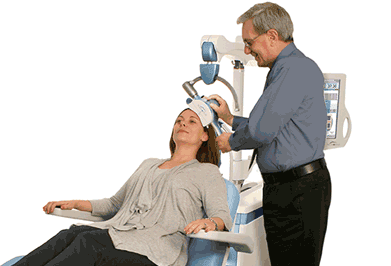 Dr. A. Mohammad have been at the forefront of TMS Therapy (TransCranial Magnetic Stimulation) since the FDA approved the system to treat patients with Major Depressive Disorder.
Dr. A. Mohammad have been at the forefront of TMS Therapy (TransCranial Magnetic Stimulation) since the FDA approved the system to treat patients with Major Depressive Disorder.
The treatment is performed through TMS, which is a pulse magnetic field produced using precision pulse Technology that focally fuels the function in brain regions that are know to affect mood. This treatment is not a drug therefore the side effects that are experienced when medications are taken to treat depression, are non-existent.
A Few Facts About TMS Therapy:
- Anesthesia and or Sedation are not required
- Procedure is non-invasive
- Easily done in a psychiatrist’s office
- Usually performed for a 4 to 6 week period, 5 days a week
See the TMS Therapy Video Featured on the Dr. Oz Show
TMS Therapy Study
A first of it’s kind study using the Neuro Star TMS Therapy system was performed in order to observe 12-month results in a sizeable data set in a real life venue.
“We have data on 257 patients that got all the way through the long-term follow-up, and we found that 68% improved and 45% had complete remission at 1 year follow-up,” study investigator Linda L. Carpenter, MD, assistant professor, Department of Psychiatry and Human Behavior, Brown University School of Medicine, and chief, Mood Disorders Program, Butler Hospital, in Providence, Rhode Island.
Although foregoing studies have revealed that TMS is a harmless and successful healing alternative for patients with TR-MDD, the long-term effectiveness and resilience of the treatments were uncertain.
- Researchers reviewed 307 depressed patients
- Applicants had a principal diagnosis of unipolar, nonpsychotic major depressive condition and
- Applicants did not receive relief from prior antidepressant care
- Average age of the partakers was 48.6 ± 14.2 years
- 66.8% of applicants were women
- Each patient initially received the typical simulation procedure
- Treatment was received everyday for a 4 to 6 week period
TMS Therapy Study Reveals Long Term Results
- 264 patients (62%) from 42 controlled exercises attained symptomatic progression
- 41% conveyed complete remission with acute treatment
- 257 of these attendees entered a 12-month long-term continuation stage of the analysis, in which they were dwindling off of the acute care routine and were observed for 52 weeks
- At the 12 month period, 68% of patients attained symptomatic progress, and 45% conveyed complete remission
“The durability of NeuroStar TMS Therapy demonstrated by this robust, real-world study is remarkable, as it’s not typical to see long-term benefit in patients who have treatment-resistant forms of depression,” study investigator Philip Janicak, MD, professor of psychiatry, Rush University Medical College, and medical director of the Rush Psychiatric Clinical Research Center, in Chicago, said in a statement.
Only limited information was available on how well patients were doing after completing a year of TMS Therapy. So this study is extremely important, explains Mark George, MD, professor of psychiatry, radiology, and neurosciences and director of the Medical University of South Carolina Center for Advanced Imaging Research as well as the Brain Stimulation Laboratory in Charleston.
“This is great news for our field and for the millions of patients who suffer from depression and do not respond well to medications,” Dr. George added.
Read the original release on TMS for Resistant Depression: Long-Term Results Are In
Other Resources on TMS Therapy





